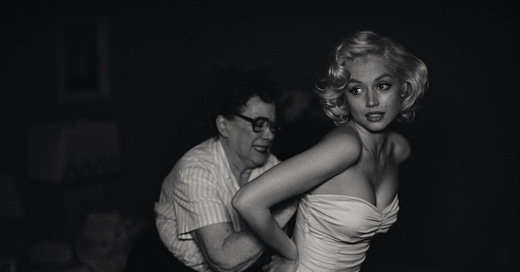Andrew Dominik’s Blonde and Andrew Dominik’s The Assassination of Jesse James by the Coward Robert Ford are both very much concerned with the warping effect of fame in America.
In the earlier film, the titular coward (Casey Affleck) is enamored with the titular victim (Brad Pitt); as the film progresses, we learn that he has read everything about James and his brothers. During one particularly embarrassing sequence, a shoebox-sized carton filled with dime books about the outlaw’s adventures is spilled out onto a bed by the teenage Ford’s older brother to the guffaws of their pals; one imagines a similarly embarrassing scene playing out a century later with Playboys (or, possibly, Playgirls) in the place of the pulps.
Jesse James undoubtedly has charisma—virtually anyone played by Pitt is imbued with that quality—but it’s the aura of renown about him that Robert Ford is drawn to. When James states plainly that “All America thinks highly of me” it’s not an idle boast; more a weary statement of fact. Robert Ford wants a piece of it, eventually gaining a fraction of the renown, at the cost of his soul, after shooting James in the back of the head. Drawn to fame like a stockbroker to cocaine, Ford gorges on it until it kills him.
In Blonde, fame feels like something that almost happens to Norma Jean Baker, aka Marilyn Monroe (Ana de Armas), a narrative reinforced by Dominik’s annoying decision to continually monkey with aspect ratios and color formats (black and white, oversaturated, etc). Dominik’s choice here is the sort of artistic hubris that only makes sense if you know, externally, that he’s changing the onscreen image’s shape and stock in an effort to replicate photos and films actually taken of Norma Jean during her life at the moment the film is portraying; sans that context, it’s merely aggravating and showy.
Whether it’s a sexual assault at the hands of a mogul or an abortion she’s required to obtain in order to take her biggest role or suffering the leers of hordes of random men as her skirt blows up around her in her most famous onscreen moment or the blowjob she’s forced to deliver to the leader of the free world while he’s flat on his back yelling into a phone, indignities are heaped upon Norma Jean one after another, year after year. Why put up with it? Well, perhaps it will help her find her father or a father-figure, someone who will keep her safe from the ugliness of the world.
Or maybe she was just born to suffer. The child of Omelas or the winner of the lottery the rest of us must torment to sate our social bloodlust.
That Dominik has no interest in the reality of Norma Jean’s life is fine; that Blonde is prurient in its interests is also fine. Artistic license and all that. That Dominik uses that license to say nothing particularly interesting or new about the cruelties of fame, hammering home at the same point relentlessly, is less fine. That viewers feel every single one of its 166 minutes is its biggest sin. Blonde is excessive in nearly every way, the Netflix production more than earning its NC-17 rating. (Good luck enforcing “no children under the age of 17 admitted to your flatscreen.”) Dominik has never really been into the whole brevity thing, but The Assassination of Jesse James by the Coward Robert Ford was at least pretty to look at while it endlessly dithered; Blonde’s harshness may be the point, but it’s not pleasant to endure.
Which, again: fine. Not all art need be pleasant. And Dominik has certainly crafted an effectively ugly film about an improbably beautiful soul. But unceasingly wallowing in suffering isn’t quite as interesting as some filmmakers seem to think.

Athena is also on Netflix now, and a better option for those who have sixty fewer minutes to kill.
Set largely in a Paris housing project, Athena’s opening 12-minute take—chronicling the announcement of the investigation into the murder of a child at the hands of police, the ransacking of the police station, and the subsequent flight back to the eponymous banlieue—sets the tone for the film. Director Romain Gavras (son of writer-director Costa-Gavras) sticks with characters and scenes in long, swooping, continuous takes, switching between over-the-shoulder shots allowing us to see what the characters are seeing and in-your-face shots that obscure the information from us.
The effect is no less showy than Dominik’s aforementioned aspect ratio tomfoolery, but it is more immersive. Gavras and cinematographer Matias Boucard expertly ratchet up the tension as we follow brothers Abdel (Dali Benssalah), Karim (Sami Slimane), and Moktar (Ouassini Embarek) in their quest to achieve justice for their little brother, Idir. Algerian immigrants, the brothers represent the paths available to such travelers: Abdel is in the army; Moktar is a drug dealer and small-time crime boss; and Karim is a disaffected youth radicalized into action.
Athena is structured, more or less, like a classic tragedy, hewing loosely to the three classic unities of time, location, and action. More films should hew, loosely or tightly, to them, as the constraints give the proceedings a pressure-cooker sensibility. Also like a classic tragedy, much of the action in Athena turns on a misunderstanding and a misapprehension, one with disastrous consequences for nearly all involved.
Athena is so tense as to be nearly exhausting, but it’s a good kind of exhaustion, the exhaustion that comes from exhilaration, rather than the exhaustion that accompanies dry eyes checking your watch as we enter minute 150 and start doing mental calculations to see just how much suffering we have left to endure onscreen.





